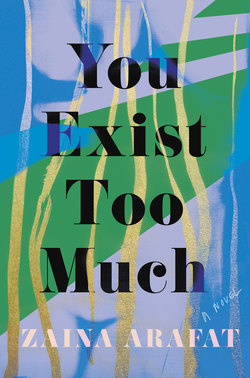Читать книгу You Exist Too Much - Zaina Arafat - Страница 16
На сайте Литреса книга снята с продажи.
ОглавлениеEVERY JUNE THROUGHOUT OUR CHILDHOOD, KARIM AND I were loaded onto a plane, our mother seated between us, our suitcases stowed in the plane’s underbelly, and hauled across the Atlantic Ocean to Jordan, not to return to the States until Labor Day weekend. We’d arrive exhausted at Queen Alia Airport, named after King Hussein’s third wife, who was, ironically, killed in a helicopter crash. We’d hire a taxi and ride along the airport road, past Bedouin tents and the occasional herd of goats, to Teta’s home in the Shmeisani neighborhood of Amman. Just like Karim and me, my cousin Reema and her sisters were hauled to Amman at the end of every school year. Reema had light brown hair and green eyes, and was five years older than me. She lived in Paris during the year and spoke with a French accent, which I and Karim both deemed to be exaggerated. One particular summer, her parents got two suites at the InterContinental, one for themselves and the other for Reema and her sisters. We spent all of June at the hotel pool; me, Reema, and our other cousin, Nour, occasionally allowing Karim to hang out with us. Everything I did was designed to win Reema’s approval. I drove the bumper car out of the ring and around the lobby at the hotel’s fun fair, until the manager dragged me back in by my ear. I knocked on room doors on every floor and ran away. When one door that I kept knocking on opened and a woman’s hand emerged, promptly smacking me across the face, the game ended. I tortured the pool staff; Reema bought itching powder and I was tasked with slipping it down the lifeguard’s shirt, which angered him so much that he beat me with a flip-flop. That time I cried and threatened to call child services, to which Nour, who lived in Amman year-round and was my main competitor for Reema’s attention, smirked and said, “Do you really think we have such things here?”
Every summer I was forced to see my father’s side of the family—his sisters, brothers and their kids. I’d pout all morning as I packed my bag and during the car ride to their neighborhood, which was far busier, noisier, and dirtier than Teta’s. They’d take me to the community pool, and I usually enjoyed it, but not that year—not compared to the hotel pool. I hesitated to get in the water, which was full of undiapered street kids, something that had never bothered me before. My paternal cousins and I weren’t allowed to order poolside entrees and Pepsis like at the InterContinental. Instead, we had to wait until we got back home to eat. As we scarfed down hummus and pita sandwiches, I sat there wondering what my mother’s cousins were doing. How much fun were they having that I was missing out on?
Finally, one of my dad’s bearded brothers drove me back to my grandmother’s apartment. I leaped from the car, entirely forgetting to say thank you or even goodbye, and rang the bell. The haris let me in. I rushed upstairs to the apartment, where the red and yellow lights above the hot water switches were both lit. My grandmother told me to hurry up and get in the tub: my mother had requested to see me at the hotel. I quickly peeled off my swimsuit and bathed, washing off the filth of the day. Afterward, Teta combed my hair as I chose an outfit. The sun was setting just as we arrived at the hotel’s terrace, where my mother and her aunts sat sipping rosé, a tray of sliced mangoes and melons in front of them, a waiter refreshing the coals in their shisha, which sent off little flecks of red embers. “Hi, mama!” my mother called out to me in the traditional, self-referential way Arab parents refer to their children: as mama and baba. My walk became a run as I dived toward the table and attempted to kiss her. But she wouldn’t stop talking long enough to let me, everyone laughing at the story she was telling, which I couldn’t understand: she was speaking too fast in Arabic, a language I was still struggling to grasp. For the majority of my childhood, I only ever understood a third of what anyone was saying. “Come,” one of my great-aunts said, waving me over after noting my disappointment. I wandered to her and received conciliatory affection before I was patted on the behind and sent off to play by myself.
At the time I didn’t realize what it was that separated the two sides of my family: that my paternal cousins did not live in the noisy neighborhood, go to the community pool, and wait to eat hummus sandwiches at home by choice.
